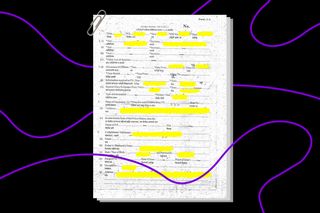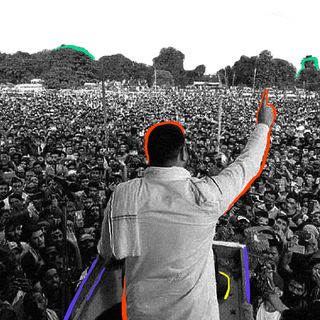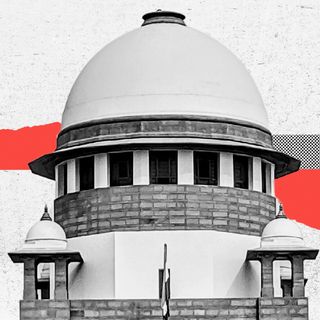
Do People Have a Legal ‘Right To Be Forgotten?’
The right to be forgotten, inextricably linked to privacy, is relevant in a digital age where our lives can be indefinitely preserved and surveilled.

The Madras High Court last week upheld a person’s “right to be forgotten.” The bench noted that those acquitted of previous charges have the right to have their names removed from the judgment — to protect their privacy.
Simply put, the right to be forgotten means the right to have one’s personal information removed from public databases and search engines once it’s no longer relevant. In India, the judicial application is still in its nascent stages. Previous petitions have noted that those acquitted, or whose court petitions are disposed of, can seek to have their names removed from the digital record to allow them to integrate back into society.
But the issue is understandably iffy for two reasons. One, deciding when someone’s information is no longer relevant is as subjective as it gets. Two, societal norms about memory have shifted in a virtual age when the digital footprint makes it near impossible to completely forget someone.
The idea of determining the “relevance” of one’s information forms the crux of the debate. A relatively innocuous example where a person’s data feels insignificant can be traced back to the first time the legal right was cited in Indian courts. In 2017, the Karnataka High Court recognized the right to be forgotten in a case involving a woman who sought a marriage annulment. Earlier this year, the Delhi High Court also upheld this right by directing internet search engines to omit references to a judgment concerning a petitioner because search results were affecting his career prospects.
But the idea of the right to be forgotten extends beyond such cases alone. The Madras HC, in the present case, was ruling in favor of a man acquitted from charges of rape and sought to have his name erased from court records. Notably, allowing the person to be forgotten in the name of “due process,” at a time when perpetrators escape conviction based on problematic arguments about their innocence, may make justice even more elusive for survivors.
The perception of this right raises two questions: when is information about someone no longer relevant? And for whom? Naturally, the scope is still debated and some argue that its application has to be balanced with the public interest as well as the freedom of speech and expression. Recognizing such contradictions, the Supreme Court in a salient right to privacy judgment concurred with the idea that the right to be forgotten should be exercised with caution.
Related on The Swaddle:
How Our Digital Spaces Came To Be Unequal and Unsafe For Women
The free speech argument is made in the context of the right potentially requiring journalistic outlets to erase names of petitioners who seek the protection of this right. Experts also worry that without the right balance, politicians and public figures may be empowered to remove unwanted coverage of them in the public domain.
Moreover, it is potentially detrimental to movements of accountability such as the #MeToo movement — in 2019, a petition against The Quint in the Delhi High Court asked that two articles about a MeToo accused to be taken down.
But this argument also reveals a complex picture. The Karnataka High Court in its 2017 judgment noted that the right is especially important for “sensitive issues” pertaining to women and their privacy. For instance, such a right may help survivors of revenge porn posted online by former partners or perpetrators of sexual assault. Currently, there is no concrete way for survivors to remove images and videos uploaded online without their consent.
The right could also potentially benefit citizens wrongly arrested or convicted at a time when law enforcement agencies are enthusiastically muzzling dissent. When the accused is arrested on charges of sedition or the draconian UAPA to further state intimidation, the right helps preserve their integration. Even as many are held in public memory as a beacon of resistance, a person may just want to go back to their lives without the burden of speaking against carceral systems.
Although there are competing arguments for and against the right to be forgotten, the idea itself merits conversation in the context of our digital footprints; where every aspect of our lives can be preserved, surveilled, bought, or sold indefinitely online.
Related on The Swaddle:
All The Arguments You Need: to Convince People They Should Care About Digital Privacy
When the default setting of human memory is to forget, what does it mean for us, and our data, that the sole purpose of default of our collective external hard drive — the internet — is to remember? The idea that our digital footprint can and will haunt us was pioneered by Viktor Mayer Schönberger, who argued that the internet tethers us to our past actions and doesn’t allow us to grow out of them. Mayer opposes the idea that the right is in contradiction with the right to freedom of speech — “to him, it is intricately tied to the natural process of forgetting things of the past,” according to the Centre for Internet and Society.
The right to be forgotten is also inextricably linked to that of privacy. In India’s recent recognition of the right to privacy as a fundamental right, Justice Sanjay Kishal Kaul noted that the “right of an individual to exercise control over his personal data and to be able to control his/her own life would also encompass his right to control his existence on the Internet.” Further, the proposed Personal Data Protection Bill 2019 acknowledges a person’s right to be forgotten, but notes this is not “an absolute right” — government-appointed officials can decide whether or not an application can be considered. This has the danger of the officer’s biases creeping into their decision on whether or not someone’s personal information is still relevant in the digital public record.
In the European Union, the right to be forgotten is recognized in a far more encompassing manner. Individuals can demand, in the interests of their personal dignity and privacy, that their personal data be removed from the internet without there needing to be any injustice meted out against them. The idea has predictably been met with fierce opposition from Big Tech, that almost cartoonishly massive, labyrinthine entity whose interests lie in mining our data for revenue.
If we’re not careful, the data containing our personal information stands to be used against us. Indeed, it already has. The Pegasus report is arguably the story of our times with respect to how our personal information can be used against us and just how dangerous our digital footprints are. Data retrieved from us without our consent can be publicly broadcast in unsavory ways, threatening the liberty and dignity of individuals.
The right to be forgotten may provide some respite if we figure out whom we want to be forgotten by — the state, the public, or both.
The right to be forgotten hinges on how we may remove ourselves from the public domain when our information is put there against our will. But can this right also extend to those who wish to retract information they put in willingly? Given these questions, the right to be forgotten is thus a key issue worth revisiting as a potential ally in the fight for our privacy and dignity.
Rohitha Naraharisetty is a Senior Associate Editor at The Swaddle. She writes about the intersection of gender, caste, social movements, and pop culture. She can be found on Instagram at @rohitha_97 or on Twitter at @romimacaronii.
Related


Angry Political Speeches Are ‘Contagious,’ Cause Voters To Mimic the Outrage: Study
